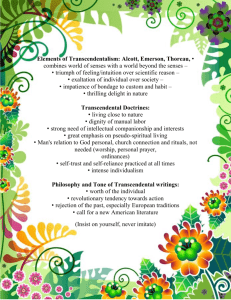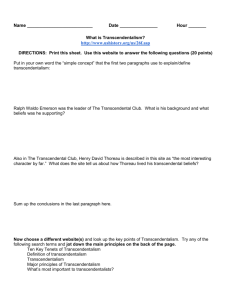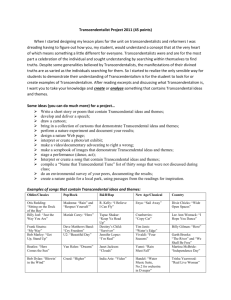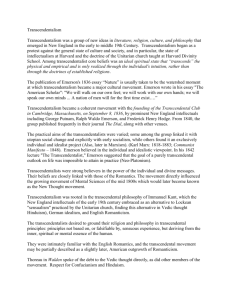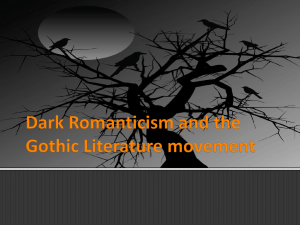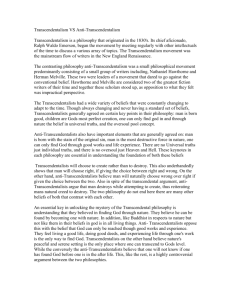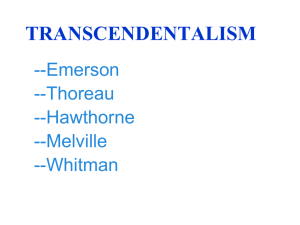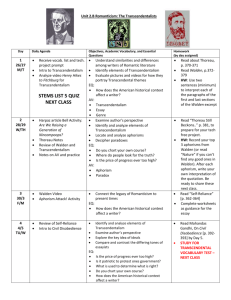Transcendentalism Model PowerPoint
advertisement
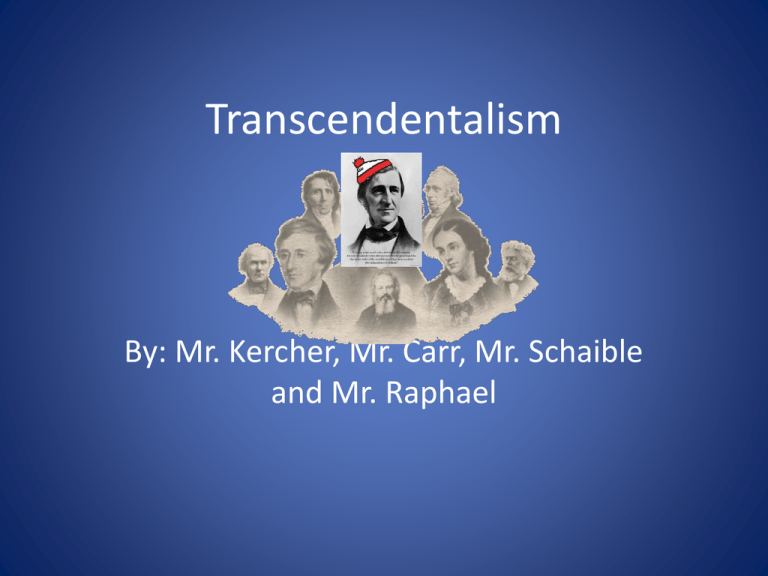
Transcendentalism By: Mr. Kercher, Mr. Carr, Mr. Schaible and Mr. Raphael Background information/Descriptions Transcendentalism was a philosophical, religious and literary movement that stressed the importance of the individual over societal institutions and traditional beliefs. Transcendentalists believed people could “transcend” (rise above) the artificial constraints of reason and society. Transcendentalism was a reaction to the rigid structures of organized religion and economic systems that kept people “enslaved” and stressed the beauty of nature. Important Leaders Amos Bronson (father)Emerson and Louisa May (daughter) Alcott were both influential Ralph Waldo transcendental father was a teacher and philosopher The recognizedfigures. leader The of the Transcendental movement, Emersonwho waswas an American personally influenced by Emerson. As a teacher, he attempted to reform the poet and essayist. traditional of education to include more individualthe instruction. He and His essayspractices Nature and Self-Reliance are widely considered most influential many students were involved in a number of reform movements of thecan worksformer detailing transcendental thought. They stress how the individual spirit period. overcome the conformist pressures of society. One his students, second daughter Louisa May,many was became an influential Theyofhad a personalhis relationship with and inspired other transcendental transcendentalist her own right. Her most famous book, Little Women, details writers, includinginHenry David Thoreau. American poet and philosopher whoand wasthe an“cult earlyofadvocate for transcendental the struggle between individualism domesticity” for girls growing thought. up during the mid-1800s. His most famous book was Walden which stressed living a simple life surrounded by nature. His essay, Civil Disobedience, argued that people should fight laws that they feel to be unjust by breaking them. His works, and his own personal involvement in the movement, inspired many abolitionists. Henry David Thoreau Amos Bronson Alcott and Louisa May Alcott Accomplishments Transcendentalism is widely considered the first unique American intellectual movement. Many individuals inspired by this movement will become the reformers that sought social change in the temperance, abolition and women’s suffrage movements. The transcendental ideals of self-reliance, positivism and individual freedom became synonymous with American artistic expression. Connection to Jacksonian Democracy The transcendental belief in the dignity and inherent wisdom of every individual was inspired by the growth of democracy and the “rise of the common man.” Many transcendentalists objected to the “cult of domesticity” and the institution of slavery and believed that increased democracy would eventually reform these problems. George Caleb Bingham, Stump Speaking, 1853 Multiple Choice Questions 1) Transcendentalism was a: a) b) c) d) e) Religious movement Literary movement Philosophical movement A and B only All of the above Multiple Choice Questions 2) Which of the following people would most likely be inspired by transcendentalism? a) b) c) d) A South Carolina plantation owner A slave on a South Carolina plantation An abolition in South Boston Andrew Jackson Multiple Choice Questions 3) Henry David Thoreau more than likely would have: a) supported Clay’s American System. b) been fearful of decreasing voting restrictions to include poorer populations. c) advocated for an increased sense of nationalism. d) felt South Carolina was justified during the Nullification Crisis.
